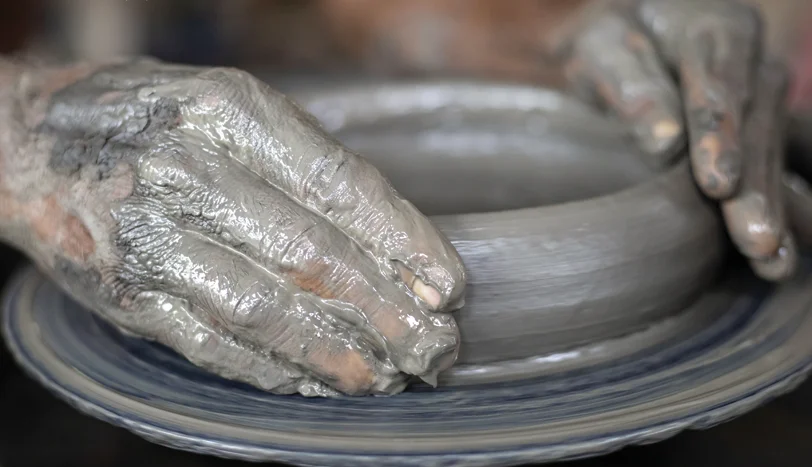
Did you know who the manufacturer of eco-friendly roofing tiles in Bangladesh is?
He is none other than Farid Hossain who has set a pace in roofing tiles innovation. Having a diploma in ceramics, he had an illustrious career for 10 years between 2006 and 2016. But he got immersed in thought about seeking certain scope to develop entrepreneurship as he never felt comfortable at a job under any employers.

Mr Farid Hossain was born and brought up in a village in central Gazipur district adjacent to Dhaka city. He used to dig into different innovative ideas and feats. Now in his 40s, he used to visit his neighbourhood since his boyhood only to see potters busy crafting ancient earthenware round the clock. That craftsmanship interested him in the making of eco-friendly traditional clay products. His inborn passion is imprinted throughout his life and career. After obtaining a higher secondary degree, Mr Farid took a four-year diploma degree in ceramic from Bangladesh Institute of Glass and Ceramics in 2006. Later, he obtained a Bachelor’s degree in electrical and electronic engineering from International University of Business Agriculture and Technology amidst his pursuit of a job.
The artisans, who crafted different ancient clay items at his village alongside his long career in the ceramic industry, enthused him greatly to contribute to the growth of the sector as a prolific entrepreneur. Mr Farid, who has a four-member family, has a profound love for soil and he keeps on exploring his passion for the motherland.
Mr Farid believes human beings are made of soil and they cannot deny it anyway. So, he always tries to explore the strength of fertile soil. Building up a connection with old-age traditional ceramic items, Mr Farid is poised to reshuffle his plan through expanding his business each year beyond the country and reaching out to people across the globe.
His factory now produces an estimated 5,000 units of tiles daily, thus amounting to 750,000 units yearly. His fully eco-friendly products are free from harmful oxide. Although Mr Farid was willing to set himself up as an entrepreneur since his early job career, he could not start it because of an acute shortage of working capital, according to this self-made man. His forefathers had been involved in farming for ages. “So, it was a Herculean task to dream of being an entrepreneur as traditionally and typically most of us in society prefer working under employers as it is regarded as better, secure and protected,” Mr Farid said.
Process of Making Roofing Tiles Only soil and silicon oil are the vital components for making tiles. Mr Farid collected soil from his localities and oil from some local importers. There is no dearth of soil in the market. Primarily, he used fuel wood to manufacture tiles. But he now uses a reticulated gas system to halt carbon emissions. Mr Farid, however, seeks piped gas as the existing system is too costly that triggers higher prices of tiles. To get a finished product, Mr Farid first collects suitable soil. Then he does the processing in the production line, including crushing, grinding, screening, moisturising, forming, drying up by a dryer, finishing by kiln and sorting to packing. Mr Farid’s Major Innovations Mr Farid was inquisitive about producing engineering products that also inspired him to develop two vital machines, which are being used to shape roofing tiles at his own factory. He used indigenous technology and locally available equipment to develop them. The machines are cheaper than the imported ones. Through these innovations, Mr Farid has been able to start his business with a paltry capital.
Why Market Growing
Although roofing tiles are costlier than any traditional rooftop solutions, people are becoming more interested in installing the artistically good-looking system as it keeps houses cosy, cold and comfortable in addition to its heat-proof condition. The system has a deciding effect on the appearance of a building and also shields houses or buildings from rain, noise, wind, fire and hails. Roofing tiles also reduce energy consumption.
Local and Foreign Market Expansion
In 2017, Mr Farid set up his enterprise with Tk 0. 2 million and 12 workers on a 20 decimal of land after amassing the funds from selling his wife’s ornaments and leasing out his father’s land without taking anything from banks or any state support. After the initial teething trouble, his business has now an outlay of over Tk 30 million with 32 employees working on an acre of land amid Covid-19 fallout and a possible recession mainly caused by the ongoing Russia-Ukraine war. According to Mr Farid, the domestic market could have expanded further with state patronage. Even local entrepreneurs could have grabbed a slice in overseas markets as the global market size is rising fast due to its aesthetic beauty and eco-friendliness. He attributed market growth to multiple state initiatives for infrastructure development in recent times.
The global roofing tiles market size was valued at $30,400.0 million in 2019 and it is projected to reach $41,354.9 million by 2027, registering a compound annual growth rate (CAGR) of 5.20 per cent from 2020 to 2027. The market size is growing as the state focus on and public mindset towards eco-friendly household products are shifting fast. Local factories are grabbing nearly 60 per cent of the market, whereas China, India and Vietnam are sharing 40 per cent. Local market leaders include Mirpur Ceramics Limited, Tradexcel Ceramics Limited, and Conforce Ceramic and Refractories Limited. Mr Farid has called upon the government to take effective measures to curb the rising import of roofing tiles and patronise the local industry for the sake of further growth of the nascent ceramic industry.









